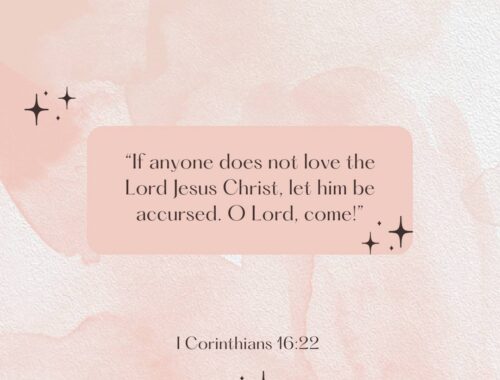1 Corinthians 11
Bible Passage: 1 Corinthians 11
I will say it upfront… I don’t quite understand the first part of this chapter.
The first verse, I get ….
Imitate me, just as I also imitate Christ.
🙂
If we have been following the Bible reading so far, we would have read about many things in Paul’s life – his actions, his words, his attitude, his love etc – are worthy for us to imitate. Why? Because he was imitating from the best person ever! Jesus!
And we would not go far wrong if we imitate Paul… (but knowing and doing as we all know are two totally different things 🙁 ).
Do We Dishonour God in our Worship?
In the first section from verses 2 to 16, if I can just summarize what I understand, Paul was trying to focus on the proper attitudes and conduct in worship.
There is a lot of discussion about headwear for the men and women – whether they should be covered or not.
But what I can gather is this: if our actions offend our fellow members and could divide the church – then we should change our ways to promote church unity. In this case, Paul was telling the women who were not wearing head coverings to wear them, not because it was a scriptural command, but because it kept the congregation from dividing over a petty issue that took people’s focus off Christ.
Just reflect on this attitude for a while: Paul encouraged the members to give up their rights for others and for the sake of not unnecessarily causing negative reactions in others within the church.
Are there any “rights” or “freedom” that I insist on that can potentially threaten the unity of the church?
I can think of a few pet “peeves” I have about the way some things are done or not being done in church. But these are just my views and feelings and not scripturally based. And if I were to insist on them or impose them on others, there will sure to be unhappiness and discontent. And I did this, I would be dishonouring God in my worship… and the worship of the church.
I think that’s where I would leave my discussion on the first part 🙂
What Have I Resolved For Thee?
The passage from verses 17 to 34 is often referred to during Holy Communion. And indeed, these lessons need to be constantly drummed into us.
We need to proclaim the Lord’s death till He comes. We have to examine ourselves and partake in a worthy manner. We need to discern the Lord’s body and blood.
And added to all this in every Holy Communion, we sing Hymn 297 where we are asked this question … “I Gave My Life for Thee”
I recently led some hymn services on the theme “Hymn and Stories” whereby I shared the stories behind a number of hymns. Knowing these stories can at times help us appreciate and understand the hymns much better and also reinforce the message found in them.
The English and Chinese version of this hymn differ in the following way… in the English version, it is sung from the perspective of Christ but for the Chinese version, we sing from our perspective…. after knowing and remembering what Christ has done for us… what have we resolved to do for Christ?
I did not manage to share the story behind this hymn in the hymn sharings but thought that I would do it now instead…
The young woman who wrote this hymn was in Germany visiting some relatives. One day, after being tired out sight seeing, she sat down in the parlour to rest and when she looked up, she saw a large painting of Christ.
In the picture, Jesus was stripped to the waist, bounded and crowned with thorns.
Pilate was there to… gesturing to the crazed crownd saying “Ecce homo!” – which means “Behold the Man!”.
And below the painting was these words: “This have I done for thee; what hast thou done for Me?”
The question penetrated her heart and moved her to tears. Quickly she found some paper and started composing a poem based on that theme.
When she returned home, she re-read the poem that she wrote and thinking that it was not very good, she threw it into the fireplace. But suddenly, a wind came in through the windowa and the scorched paper was blown out of the fire. Later, her father found it and encouraged her to publish the poem.
That is the origin of our hymn, “I Gave My Life for Thee,” with its corresponding question, What hast thou done for Me?”
The hymn begins…
I gave My life for thee, My precious blood I shed,
That thou might’st ransomed be, and quickened from the dead;
I gave, I gave My life for thee, what hast thou given for Me?
Of course the Lord does not require us to somehow pay Him for Calvary.
As Pr CAQ reminded us in the last Holy Communion service, Salvation is offered as a free gift… because if there is a price attached to it, we can never ever pay the price. We should receive this free gift in faith as Christ has already paid its full price. The Bible says salvation is “by grace”–God’s unmerited favour, and “not of works, lest anyone should boast” (Eph. 2:8-9).
Since we have received such a great grace and priceless gift, how do we respond? Our conduct under grace is to arise from grateful hearts, freely responding to what God has done. As a Christian, our willing expression of love should provide an answer to the question, “What hast thou done for Me?”
As Paul puts it, “the love of Christ compels us” (2 Cor. 5:14). It urges and impels us to respond in kind.
Paul understood all this… so should me… if we imitate him as he imitated Christ.
1 Corinthians 10
1 Corinthians 12
You May Also Like

1 Corinthians 16: Loving the Saints, Loving the Lord
February 27, 2023
1 Corinthians Chapter 10
February 13, 2023
